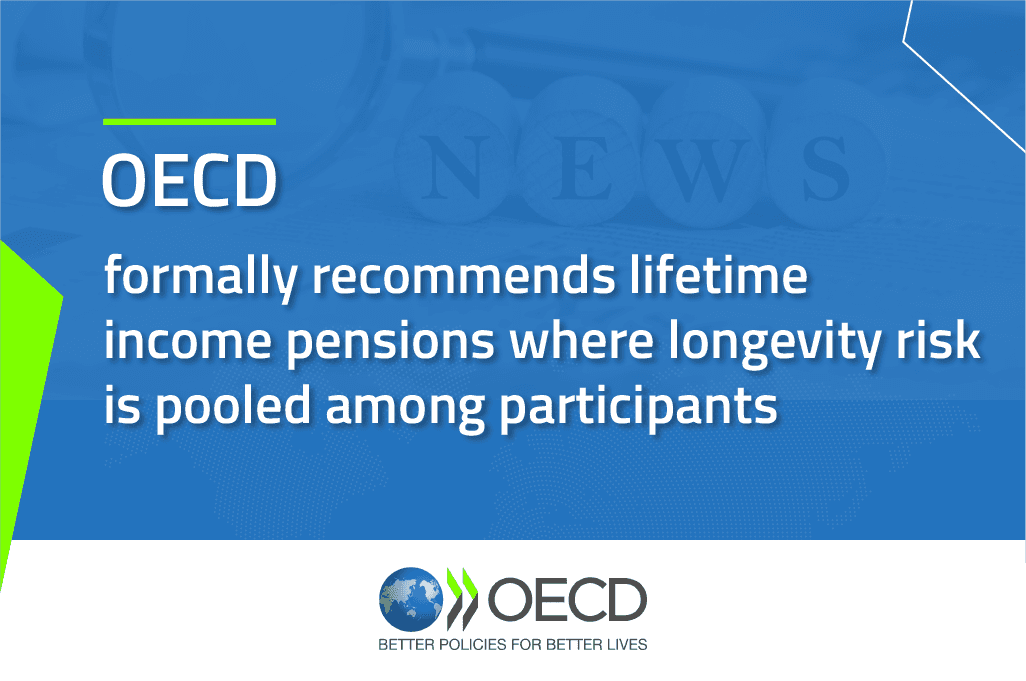On 23rd Feb 2022, the OECD Council adopted Legal Instrument 0467 recommending that pensions should, by default, include lifetime income in the pay-out phase.

Feb 28, 2022

02:59 min read
Seismic: OECD calls for default lifetime income Tontines
Dean McClelland

Seismic: OECD Legal Instrument calls for DC pensions to provide lifetime incomes 'by default'.
On 23rd Feb 2022, the OECD Council issued a Legal Instrument which formally adopts the Recommendation for the Good Design of Defined Contribution Pension Plans on the proposal of the OECD's Insurance and Private Pensions Committee (IPPC).
Legal Instrument 0467 stipulates 10 steps that Member States & Adherents are expected to implement to improve the robustness of both occupational and personal pensions plans.
The steps include sensible recommendations about transparency, simplicity, low-fees and even warns governments about the benefits of fair competition and to guard against the risks of an 'oligopolistic' pension industry.
The key change however can be found in Part 7. Unlike the original recommendations in 2012, the OECD now insists that DC Pensions are now expected, by default, to “Ensure protection against longevity risk in retirement”.
The instrument states that ‘Full lump-sums should be discouraged in general' and instead that ‘DC pension plans should provide some level of lifetime income as a default for the pay-out phase’ and that this lifetime income can be provided ‘by annuities with guaranteed payments or by non-guaranteed arrangements where longevity risk is pooled among participants’ such as in a tontine.
The stipulation of mandatory lifetime income will surely be a shock to the incumbent DC pensions industry (albeit that Australia has been attempting to implement such a policy change for several years now) and it is likely that very few pension industry participants will be able to follow the recommendation to act in 'peoples best interest' until they become more familiar with the advantages of tontines over annuities. Thankfully these advantages were described in detail by other recent OECD papers as follows:
‘Tontines’ or a ‘tontine-type annuity’ are ‘arrangements where risks are shared collectively among members’ where ‘the initial benefit depends on the level of assets accumulated at retirement, and it can be adjusted going forward depending on the investment and longevity experience’.
‘Collective retirement income arrangements with risk sharing offer real benefits over individual arrangements in terms of risk mitigation and the level of expected retirement income, even without an external guarantee from a provider. Nevertheless, it is important that the distribution of risks among the participants of a collective arrangement is perceived to be fair.’
The OECD paper goes on to detail ‘the benefits of sharing risks collectively’ as follows:
‘The ability for a collective retirement income arrangement to pool risks and smooth funding shocks over time can significantly mitigate the risks that individuals would otherwise bear on their own. This increases the certainty that they will be able to receive a reasonable level of retirement income for life. The mitigation of the risk at the individual level allows higher retirement incomes to be paid, and ultimately increases the collective capacity of the arrangement to invest in higher risk assets that will provide an even higher expected retirement income overall’.
‘Collective risk sharing can be limited to within a specific cohort or shared across cohorts or generations... Idiosyncratic longevity risk, or the risk that any individual will live longer than the average life expectancy, is easily mitigated by pooling risks within a given cohort. With this type of risk sharing, people who die earlier subsidise those dying later. This means that all participants can increase their retirement income because they do not need to plan to have additional savings to cover the risk of living beyond the average life expectancy.’
About Tontine Trust
Since 2017, Tontine Trust has been designing, developing & patenting systems for the administration of actuarially fair modern tontine pensions which are simple to understand, offer award-winning levels of transparency and charge significantly lower fees than fixed annuities provided by insurance companies.
In addition to developing our own line of pension products, we have been invited to discuss large scale deployments with governments, development banks and multi-national financial institutions.
Our first digital tontine pensions will go live in 2022 and will serve as a template to be rolled out across the majority of OECD member states within the coming years.
The full details of OECD Legal Instrument 0467 can be found here.

Opinion: DoL has the obligation to regulate conduct affecting qualified accounts
Read the thoughts of Kerry Pechter, author of Annuities for Dummies and Editor of the Retirement Income Journal on the reaction to the proposed rule changes.



Canada joins the global shift to tontine pensions.
Following hard on the heels of the OECD recommending that tontine pensions are made mandatory, OECD member Canada is reshaping its pension system. Their planned new tontine pension will be called a Variable Payment Life Annuity, conveniently shortened to VPLA. The VPLA tontine will do exactly what it says on the tin and provide a payment stream that varies based on the performance of the underlying investments and the rate at which members pass away. Amending the local legislation will take a few years but will potentially remake the private sector pension landscape in Canada.



Tontines: rebuilding the economy & the pension crisis solution?
How Belgium plans for recovery in the post-Covid world.






























